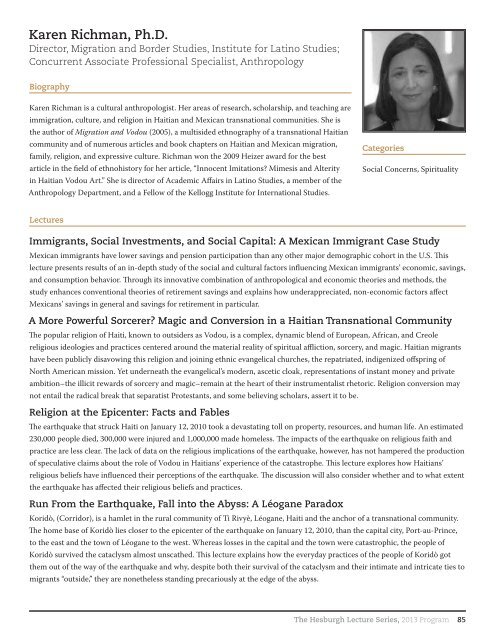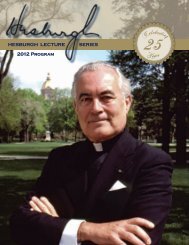HESBURGH LECTURE SERIES 2013 Program - Alumni Association ...
HESBURGH LECTURE SERIES 2013 Program - Alumni Association ...
HESBURGH LECTURE SERIES 2013 Program - Alumni Association ...
Create successful ePaper yourself
Turn your PDF publications into a flip-book with our unique Google optimized e-Paper software.
Karen Richman, Ph.D.<br />
Director, Migration and Border Studies, Institute for Latino Studies;<br />
Concurrent Associate Professional Specialist, Anthropology<br />
Biography<br />
Karen Richman is a cultural anthropologist. Her areas of research, scholarship, and teaching are<br />
immigration, culture, and religion in Haitian and Mexican transnational communities. She is<br />
the author of Migration and Vodou (2005), a multisided ethnography of a transnational Haitian<br />
community and of numerous articles and book chapters on Haitian and Mexican migration,<br />
family, religion, and expressive culture. Richman won the 2009 Heizer award for the best<br />
article in the field of ethnohistory for her article, “Innocent Imitations? Mimesis and Alterity<br />
in Haitian Vodou Art.” She is director of Academic Affairs in Latino Studies, a member of the<br />
Anthropology Department, and a Fellow of the Kellogg Institute for International Studies.<br />
Lectures<br />
Immigrants, Social Investments, and Social Capital: A Mexican Immigrant Case Study<br />
Mexican immigrants have lower savings and pension participation than any other major demographic cohort in the U.S. This<br />
lecture presents results of an in-depth study of the social and cultural factors influencing Mexican immigrants’ economic, savings,<br />
and consumption behavior. Through its innovative combination of anthropological and economic theories and methods, the<br />
study enhances conventional theories of retirement savings and explains how underappreciated, non-economic factors affect<br />
Mexicans’ savings in general and savings for retirement in particular.<br />
A More Powerful Sorcerer? Magic and Conversion in a Haitian Transnational Community<br />
The popular religion of Haiti, known to outsiders as Vodou, is a complex, dynamic blend of European, African, and Creole<br />
religious ideologies and practices centered around the material reality of spiritual affliction, sorcery, and magic. Haitian migrants<br />
have been publicly disavowing this religion and joining ethnic evangelical churches, the repatriated, indigenized offspring of<br />
North American mission. Yet underneath the evangelical’s modern, ascetic cloak, representations of instant money and private<br />
ambition–the illicit rewards of sorcery and magic–remain at the heart of their instrumentalist rhetoric. Religion conversion may<br />
not entail the radical break that separatist Protestants, and some believing scholars, assert it to be.<br />
Religion at the Epicenter: Facts and Fables<br />
The earthquake that struck Haiti on January 12, 2010 took a devastating toll on property, resources, and human life. An estimated<br />
230,000 people died, 300,000 were injured and 1,000,000 made homeless. The impacts of the earthquake on religious faith and<br />
practice are less clear. The lack of data on the religious implications of the earthquake, however, has not hampered the production<br />
of speculative claims about the role of Vodou in Haitians’ experience of the catastrophe. This lecture explores how Haitians’<br />
religious beliefs have influenced their perceptions of the earthquake. The discussion will also consider whether and to what extent<br />
the earthquake has affected their religious beliefs and practices.<br />
Run From the Earthquake, Fall into the Abyss: A Léogane Paradox<br />
Koridò, (Corridor), is a hamlet in the rural community of Ti Rivyè, Léogane, Haiti and the anchor of a transnational community.<br />
The home base of Koridò lies closer to the epicenter of the earthquake on January 12, 2010, than the capital city, Port-au-Prince,<br />
to the east and the town of Léogane to the west. Whereas losses in the capital and the town were catastrophic, the people of<br />
Koridò survived the cataclysm almost unscathed. This lecture explains how the everyday practices of the people of Koridò got<br />
them out of the way of the earthquake and why, despite both their survival of the cataclysm and their intimate and intricate ties to<br />
migrants “outside,” they are nonetheless standing precariously at the edge of the abyss.<br />
Categories<br />
Social Concerns, Spirituality<br />
The Hesburgh Lecture Series, <strong>2013</strong> <strong>Program</strong> 85



